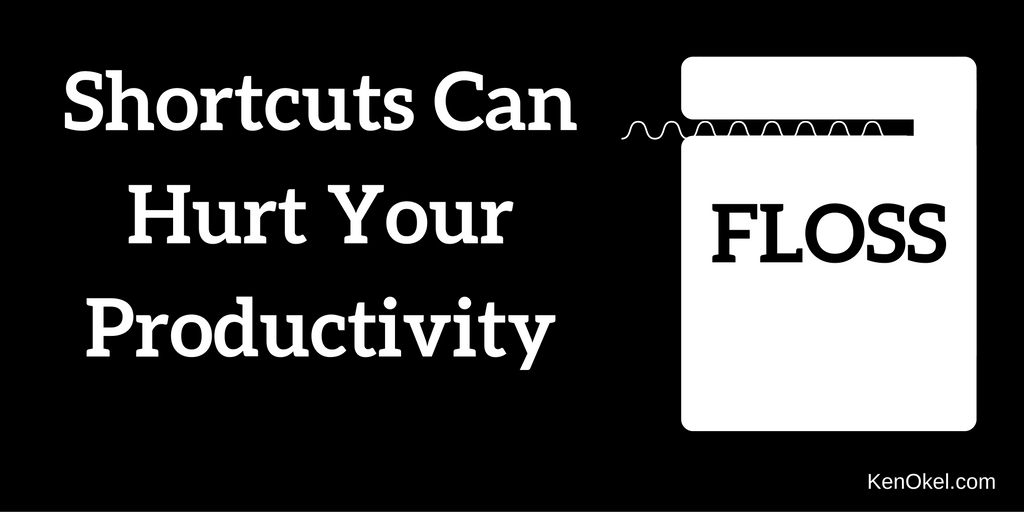 A lot of people think that shortcuts at work are something to be pursued but often shortcuts can hurt your productivity. The problem is a certain kind of shortcut that doesn’t help you even though you think it’s a smart idea. The reason is that the savings in time or money may not add up as much as you think.
A lot of people think that shortcuts at work are something to be pursued but often shortcuts can hurt your productivity. The problem is a certain kind of shortcut that doesn’t help you even though you think it’s a smart idea. The reason is that the savings in time or money may not add up as much as you think.
Imagine that you’re at your dentist’s office. It’s time for your hygienist to floss your teeth*. He or she will pull out a strand of the dental floss and start to work it into your teeth.
Time and time again I’ve noticed something about this moment: The hygienist uses more floss than is necessary.
At home, sometimes I can be a bit of a floss cheapskate. I use what I think is just enough. Sometimes, this means I calculate incorrectly and have to pull out more floss. By trying to cut corners and save a penny or two, I actually end up costing myself more. That can be the price of an ineffective shortcut
At the dentist office, I’m sure there are concerns about saving money. But not where floss is involved. A generous amount is pulled out.
The goal is not to save a small amount of money but to be 100% sure you’ll get the job done right the first time. Sure, the dentist will pay a few cents more for floss but it’s an acceptable loss if it keeps patients happy. And happy patients will stick around and pay for expensive procedures down the road.
Just think what messages a small strand of floss sends to a patient. You’re basically saying, “You’re not worth an inch or two more,” or “Oh my gosh, I had no idea your mouth required so much floss.”
Other shortcuts at work are based on assumptions that may not be true. Your business could decide to not buy a copier or a printer. This will save you money but create problems when you need to make a copy or print something.
In this scenario, someone has to stop what he or she is doing and go to a business that has self-serve copiers or printers. So the savings isn’t as significant when you figure in the opportunity cost of the labor needed to visit off site copier.
Often these shortcuts at work are made with good intentions and little supervision. Someone who means well makes a decision that has a lasting impact on everyone.
Don’t be afraid to ask, “Why are we doing things this way?” if it seems like someone may have come up with cheap but costly solution to a problem.
Make sure people understand that true savings come when you are efficiently and effectively pursuing your goals.
*This analogy has nothing to do with the recent report that said there’s no evidence to support that flossing is good for you health. I’m a fan of flossing and will continue to have it be part of my daily routine.





